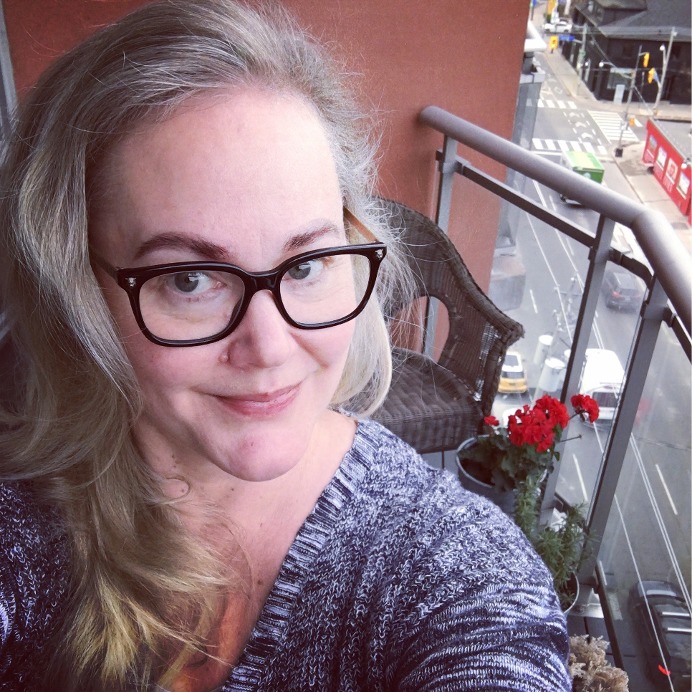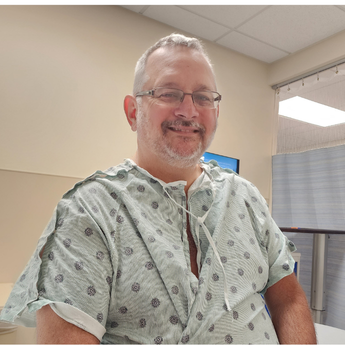 In our monthly column, senior writer and editor Adriana Ermter shares her personal experiences with breast cancer.
In our monthly column, senior writer and editor Adriana Ermter shares her personal experiences with breast cancer.
By Adriana Ermter
Recently, after spending eight hours with abdominal pain so intense I was doubled over, I conceded to my sister Liz, who insisted a trip to the hospital was necessary and crawled downstairs, ordered an Uber, pulled a patterned facemask over my nose and mouth and went. Twelve hours, three hits of morphine and one magnetic resonance imaging (MRI) scan of my lower abdominal organs later, the emergency room doctor told me a lesion on the right side of my liver was the culprit. Based on the scans I’d had taken of my major organs prior to my breast cancer surgery, the lesion was new and potentially the result of the original tumor and/or the treatment I’d received post-operation. An ultrasound followed, revealing the lesion’s 5cm length by 5cm depth by 5cm width. A second MRI has been scheduled.
Choosing Survival
What I hadn’t anticipated scheduling was a new set of doctor appointments to determine whether or not the tumor in my liver is malignant. According to the Mayo Clinic, approximately 42 percent of breast cancer survivors can have a local recurrence in the breast or even a distant recurrence (otherwise known as a secondary cancer) where the cancer has travelled to other parts of the body, most commonly to the bones, lungs and liver. These additional cancers can be and are clearly listed as possible side effects from the initial breast cancer and/or radiation treatment to remove and kill the breast cancer cells. I know this because I read about it in the pamphlets the doctors and nurses pressed into my hands upon my diagnosis and after my surgery. Still, it didn’t deter me from joining the 60 percent of women the US Breast Cancer Organization says are diagnosed with early-stage breast cancer, have a lumpectomy (aka partial mastectomy) and choose surgery and radiation treatment to increase their survival rates.
I wanted to survive, so I’d consciously chosen both just as deliberately as I’d chosen to have breast-conserving surgery and to have my tumor profiled through Oncotype DX testing to help determine if I needed aggressive chemotherapy and/or the chemo-infused oral drug, Tamoxifen. Sure, my oncology team had expounded their expert opinions with me every step of the way, but ultimately each choice I made was mine. I think that’s really important to emphasize. The health of my body and how I want to walk through each phase of breast cancer, and now possibly liver cancer, is my decision and mine alone to make. I know this sounds like a no-brainer, but it’s not.
Choosing Education
When I first learned I had breast cancer, my brain went into overload. For months, the doctors at the breast cancer clinic—where I’d gone when I’d first felt the hard lump in my right armpit—dismissed my concerns, and despite my ongoing requests for more testing, continued to ignore these requests for the next six months. My choice, to politely and consistently nag the clinic paid off, however, rewarding me with the testing I needed and the positive breast cancer diagnosis I didn’t want, but was grateful to know about.
That’s when the ambivalence transformed into an onslaught of general information about ultrasounds and biopsies, lumpectomy surgery and pain management, possible courses of treatment and side effects. Everything moved at a rapid-fire pace. It was hard to keep up and I felt left in the weeds. So after each appointment—back then I had one every other day or so—I’d go home and Google anything and everything breast cancer related for deeper understanding, education and clarification. I don’t necessarily recommend this route. It escalated my 3 a.m. anxiety-induced insomnia from lying in bed staring at the ceiling trying to remember the words to Heavy D & The Boys “Now That We Found Love” to binge-shopping purple, blue, darker shades of blue and grey matching sweat pants and sweatshirt sets into online. .It was the only way I could anesthetize my whirling mind. The paper handouts and glossy generalizations shared by my doctors, along with WebMD and the cancer societies I knew to look up, did not impart enough specific information. I wanted insight into what was happening to me and for me, so that I could feel in control and make the right choices. I needed to know more.
Choosing Tenacity
Considering that, according to the Canadian Cancer Society, 75 women are newly diagnosed each day, this lack of specific information is understandable. There aren’t enough breast cancer doctors or hours in the day to properly connect with each new patient and tell them what they deserve to know. And because of these sausage-factory-like conditions, physicians become immune, callous almost, to the disease and how its existence shakes the lives of each person they diagnose. That’s the problem with breast cancer. Everyone and every breast cancer is unique, yet nearly all communication is generic, so it’s up to you to dig deeper, gain more knowledge and then, choose how to move forward. At least that’s my opinion.
Nearly everyone I shared my breast cancer status with also had an opinion, particularly about what course of treatment I should take. One of my closest friends pushed hard for a full and double mastectomy. She’d had family members die from other cancers and leaned towards a more extreme approach. Another repeatedly said I should be worried that I will die. I had to kindly, but firmly ask him to stop since worrying has never worked out for me. My dad suggested I move back to Calgary so that my family could take care of me, while a relative poo-poo’ed the severity of my diagnosis, surgery and recovery, calling it an easy and routine procedure. They all meant well, so I listened to everyone and answered to no one. That too was a choice and probably my best one.
Choosing Myself
From my point of view, there is no best way to navigate breast cancer and all that it entails, including a potential, secondary cancer. I can’t predict how the future will unfold, so all I can do is make the right decisions for myself in each moment. Because I believe information and insight is power, I choose to educate myself. I’m often left to my own devices, which means I’ve read too much, discovered a lot and chosen to look for, find and tap into other women who’ve been there and done that before me. Sometimes they’re found in personal blogs like this one on the Canadian Breast Cancer Network or through other online sites, like Rethink Breast Cancer.
One woman, a former colleague, along with a new friend who I’d known of for years, thanks to working in the same industry, became invaluable finds. They candidly, thoroughly and compassionately shared their firsthand experiences with me. At the recommendation of a mutual friend, I chose to seek out the first woman when I was diagnosed. She, not my oncology team, emotionally prepared me for my surgery, encouraged I buy not one but several soft, underwire-free bras to sleep in to help minimize the pain. She was the one who forewarned me that I would be tattooed with grid-like dots prior to beginning radiation, how I would feel utterly and completely exhausted throughout the process and validated that it was okay to sleep every non-working hour of each day. The second held my hand through recovery and the brain-fogged road I would and continue to walk. Our cancers and personal situations were similar, although she experienced everything a full year before me, so I feel like no one else understands this part of my life better. She continues to be a safe place and a sounding board for the feelings of inadequacy I still feel as I try to embrace my post breast cancer self.
I chose to hear and learn from these women and their breast cancer journeys. They empowered me to make informed decisions for myself, which in turn has helped me better tune into my gut instincts and to follow them. Even now, I continue to take the course of action I believe will be most beneficial for me. All of my choices combined remind me that even in uncertainty, I get to make the final decision. So today, as I await my upcoming testing, its results and the new path ahead of me I know that I always have a choice. So I continue to choose me.
Adriana Ermter is a multi award-winning writer and editor. Her work can be read in Figure Skater Fitness and IN Magazine, as well as online at 29Secrets.com, RethinkBreastCancer.ca, Popsugar.com and AmongMen.com. The former Beauty Director for FASHION and Editor-in-Chief for Salon and Childview magazines lives in Toronto with her very spoiled cat, Trixie-Belle. You can follow Adriana on Instagram @AdrianaErmter






